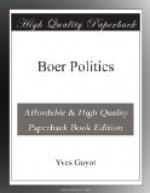The murder of Edgar was a small matter in the same way as the Dreyfus case was a small matter; only when a case of this nature arises, it reveals a condition of things so grave that it excites widespread feeling at once.
Edgar was an English workman, a boilermaker, who had been a long time in Johannesburg; a well-conducted man and generally respected. He was going home, one Sunday night in 1898, when three drunken men insulted and set upon him. He knocked one of them down. The other two called the police. Edgar, meanwhile, entered his own house. Four policemen broke open his door, and the instant Edgar came out into the passage, Policeman Jones shot him dead with a revolver. “A mere police row,” says Dr. Kuyper.
Jones was arrested next morning, but straightway released upon a bail of L200. The money was not even paid in, but carried over to be deducted monthly from the future salaries of other members of the Johannesburg police force.
Feeling was strong among the other English workmen, many of whom knew Edgar; and this feeling was intensified by the subsequent parody of justice.
3.—An Ingenious Collusion.
The State Attorney, Mr. Smuts, informed the Acting British Agent, Mr. Fraser, that it would be better to bring a charge against Policeman Jones, for “culpable homicide” than for murder, but that he considered the chance of his conviction by a Boer jury to be very small. The word “culpable,” says Webster (English Dictionary) is “applied to acts which have not the gravity of crime.” In this instance, it made Jones’ action excusable on the grounds that Edgar struck him with a stick, at the moment of his entering the house.
A journalist, Mr. J.S. Dunn, Editor of The Critic, commented upon the action of Dr. Krause, the First Public Prosecutor. Dr. Krause took criminal action against Mr. Dunn for libel, and, before proceeding with the murder trial, appeared as witness in his own case, and swore that he did not consider that Jones had been guilty of murder; he not only made this statement on oath, but called the Second Public Prosecutor who gave similar evidence. Nor was this all. He brought forward the accused himself, as witness to state that the First Public Prosecutor was right in not committing him for murder!
When this ghastly farce had been performed, which is much on a footing with the examination of Esterhazy by Pellieux, the murderer was free to present himself confidently before a Boer jury. Not only was he acquitted, but the presiding judge, Kock, who had claimed a judgeship as a “son of the soil,” in pronouncing judgment added this little speech: “I hope that this verdict will show the police how to do their duty.” This amiable conclusion did not seem very re-assuring to the Uitlanders.
At the same time Mr. Krueger suppressed two newspapers, The Critic and The Star. (See Blue Book C. 9, 345.)




